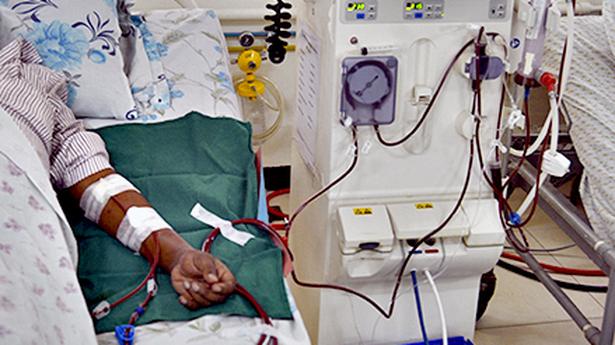
Patients suffer as equipment in State-run dialysis units in Karnataka are dysfunctional or not serviced
The Hindu
Members cutting across party lines raised the issue in the Karnataka Legislative Assembly last week
Harsha Naik, a 21-year-old resident of Mudanahalli in Arasikere taluk, who has been on dialysis for the last four years, was hospitalised thrice in the last one year following repeated infections.
On Tuesday, 58-year-old Siddaraju, who is on dialysis in T. Narasipura centre, had a harrowing time owing to blood clotting in the dialyser and blood tubes. Along with him, seven other patients also had a similar problem at the centre.
Several dialysis machines in the 169 State-run dialysis centres are either dysfunctional or have not been serviced causing severe hardship to patients.
“If one machine does not work, we will have to accommodate the patients on the remaining two machines as per the instructions of the Kolkata-based outsourced service provider — ESKAG Sanjeevini Pvt. Ltd. The agency coordinators ask us to reduce the dialysis hours of each patient from four to two to accommodate all patients,” a source in the dialysis centre said.
Patients at the Ankola taluk hospital staged a snap protest on Monday as some of them were asked to go to Karwar for dialysis. “I travel 40 km from Kuntagini where I reside to get dialysis at Ankola. If I have to get dialysis at Karwar, I will have to travel another 35 km, which is very tiresome for me considering my poor health,” said Ganesh Shetty, one of the patients.
Besides, Medical Reverse Osmosis (RO) plants at many centres have a high Total Dissolved Solids (TDS) value, which is above the permissible limits and hence unfit for dialysis. The water treatment system is a critical factor for dialysis. Ultra pure water from the RO plant that enters the hemodialysis machine is used to mix the dialysate for dialysis.
“Although the water from the RO plants is unfit for dialysis, we are forced to use it as per instructions of the service provider. This is causing infections in patients,” one of the technicians said.

The girl, who was admitted to Aster CMI Hospital with alarming breathlessness and significant pallor, was diagnosed with Wegener’s Granulomatosis (now known as Granulomatosis with Polyangiitis or GPA), a rare autoimmune condition that causes spontaneous bleeding in the lungs, leading to acute respiratory failure.

ACB files case against IPS officer N. Sanjay in Andhra Pradesh. The official is accused of manipulating the tender processes for awarding contract for development and maintenance of AGNI-NOC portal, and conducting awareness meetings for SC/STs. It is alleged that the total value of properties stolen, or involved in the case is estimated at ₹1,75,86,600.









